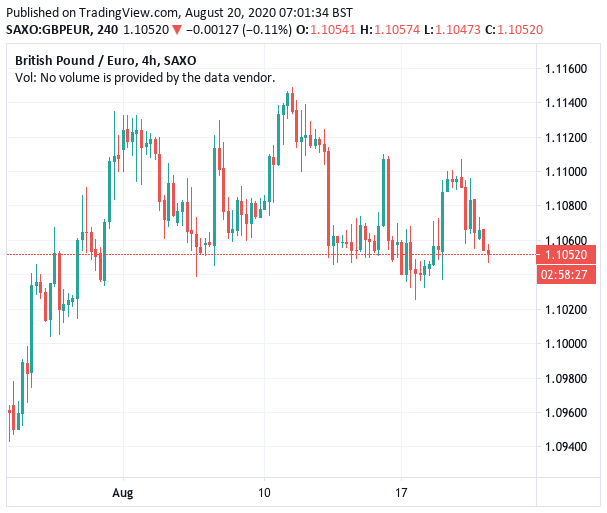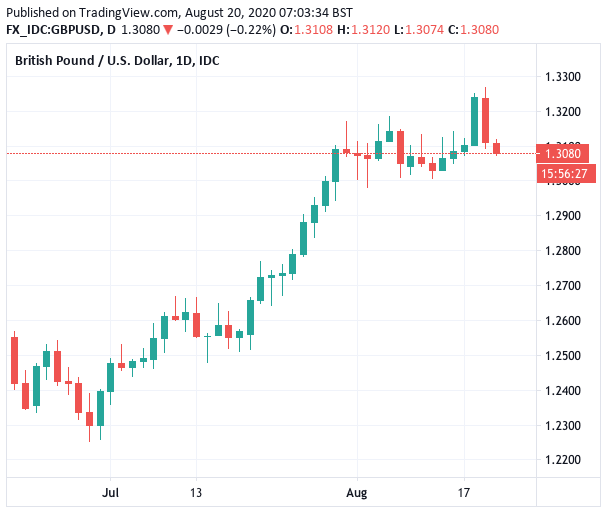Pound Sterling's Party Can't Last: Analysts Question Recent Performance against Euro and U.S. Dollar
- GBP in spectacular reversal against USD
- Back to lower end of Aug range vs. EUR
- Analysts say recent rally likely to fade
- Eyes turn to Friday's conclusion of latest round of Brexit trade negotiations

Above: File image, Prime Minister's Europe Advisor and Chief Negotiator David Frost host talks with chief negotiator for the European Union Michel Barnier inside No10 Downing Street. Picture by Andrew Parsons / No 10 Downing Street
- GBP/EUR spot: 1.1053 | GBP/USD spot: 1.3091
- GBP/EUR bank rates: 1.0844 | GBP/USD bank rates: 1.2824
- GBP/EUR specialist rates: 1.0954 | GBP/USD specialist rates: 1.2973
Learn more about market beating exchange rates, here
Pound Sterling has retreated from its recent highs with a strong comeback by the heavily sold Dollar shaking the foreign exchange markets back to reality, confirming moves in the Greenback to be a major driver in current market conditions.
The Pound-to-Dollar exchange rate has fallen back by a percent to quote at 1.3076 at the time of writing, blunting what had been a stellar run for Sterling.
The Dollar comeback, and retracement of the Pound, looks to ultimately be due to a turn lower in investor sentiment overnight. Remember, the Dollar does remain a safe haven that tends to benefit when global stock markets and commodity prices turn red.
"A risk-off mode has swept across financial markets following the release of a downbeat assessment of the economic outlook from the US Federal Reserve. The minutes to the July policy meeting were published last night and showed increased concern amongst Fed officials over the pace of US growth in the second half of the year amid ongoing tensions with China and the current health crisis," says Nikesh Sawjani, economist at Lloyds Bank.
The losses against the Dollar appear to have translated into losses against other Sterling exchange rates, with the Pound-to-Euro exchange rate going back down to 1.1053 which places it back towards the lower end of its August range:
Above: GBP/EUR declines to bottom of the August range
The British Pound had been the best performing major currency of the past month heading into the mid-week session after rising against all its G10 peers, amidst a combination of broader Dollar weakness and some improvement in factors specific to the UK including an accelerating economic recovery, optimism EU and UK negotiators would ultimately reach a trade deal in October as well as a growing conviction the Bank of England would refrain from cutting interest rates into negative territory.
However the majority of analysts we follow warn this outperformance cannot last given Brexit concerns will rise as negotiations head into their final stages.
"Brexit concerns are expected to stifle Sterling’s gains, and there is a clear feeling of optimism that belies the dangers that lie ahead," says Joshua Mahony, Senior Market Analyst at IG.
The focus on Sterling's Brexit concerns has most likely been sharpened by the fact that the EU and UK's negotiating teams have reconvened to try and agree a deal in Brussels this week, with expected updates from principals Michel Barnier and David Frost on Friday offering a potentially volatile end to the week for the UK currency.
Above: GBP/USD performed a spectacular reversal on Wednesday, August 19
A headline in the Financial Times has not helped sentiment, as it is reported the EU has rejected the UK’s opening demands for continued wide-ranging access to the EU for British truckers, "setting the stage for a clash".
"There was certainly nothing in the Brexit talks to encourage a bid into Sterling as the EU is pushing back against UK proposals for UK-based truckers’ access to the single market. Time is running out and promising headlines are needed for Sterling to maintain course," says John Hardy, an analyst at Saxo Bank.
The haulier issue comes on top of existing tensions over EU access to UK fishing waters as well as the EU's desire for the UK to follow EU competition rules once it has let the bloc.
"Brexit and the Pound will be in the spotlight after the latest round of talks between EU and UK representatives started again. The two parties ideally want to reach a deal as soon as, with the negotiations scheduled to conclude on 2nd October, a couple of months ahead of the end of the transition period. In other words, only one month and a bit is left for the UK and EU to a strike a comprehensive deal. I have a feeling, like other economists, that this is not going to be enough, so the talks may have to be extended and the negotiations may go down to the wire," says Fawad Razaqzada, Market Analyst at Think Markets.
Given these views, those with Sterling based international payments who are concerned about a loss of value can protect their budget by locking in current rates for use at a date in the future.
Razaqzada also expresses concerns for the UK economy which he says is struggling to recover from the pandemic, "and with the virus making an unwelcome return to parts of Europe, the UK is in danger of catching the cold again".
"Against this backdrop, you have to wonder how much further the Pound could rise. I certainly would not be surprised if Sterling were to turn lower from around the current levels, although equally I wouldn’t rule out the prospects of further short-term gains before the real pain kicks in, in the not-too-distant future," says Razaqzada.
In the slightly long-term outlook, the analyst says the direction of the Pound will depend on the outcome of Brexit negotiations and how well or otherwise the economy will recover from the pandemic.
"A persistent current account deficit, the possibility that policy rates move negative, a surging fiscal deficit and the risk that a free-trade deal with the EU may fail leave the GBP vulnerable. The GBP should underperform in any return to risk aversion," says Bernhard Eschweiler, Senior Economist at QCAM Currency Asset Management AG.
Jane Foley, Senior FX Strategist at Rabobank says the GBP/EUR exchange rate will likely remain the main barometer of market sentiment towards the trade negotiations.
"Since politicians are incentivised not to concede early, the current Brexit trade talks are likely to push well into September and this could see EUR/GBP pushing towards the 0.92 level as nerves become increasing frayed. We would then expect EUR/GBP to drop back below 0.90," says Foley.
A EUR/GBP exchange rate at 0.92 gives a GBP/EUR exchange rate of 1.0870, a EUR/GBP rate of 0.90 gives a GBP/EUR rate of 1.11.
Thomas Flury, Strategist at UBS holds a similar view:
"With regards to Brexit, progress seems to be being made behind closed doors, although the lack of newsflow is doing little to calm investors' nerves. We think current market pricing reflects the state of play quite well. We still expect an agreement between the UK and the EU, but confirmation is likely to come a little later than many would like."
Most foreign exchange analysts do however remain of the view that a deal of sorts will be agreed, which would relieve the currency of the political risk premium it has been carrying for some time and allow it to potentially make more substantive gains.






